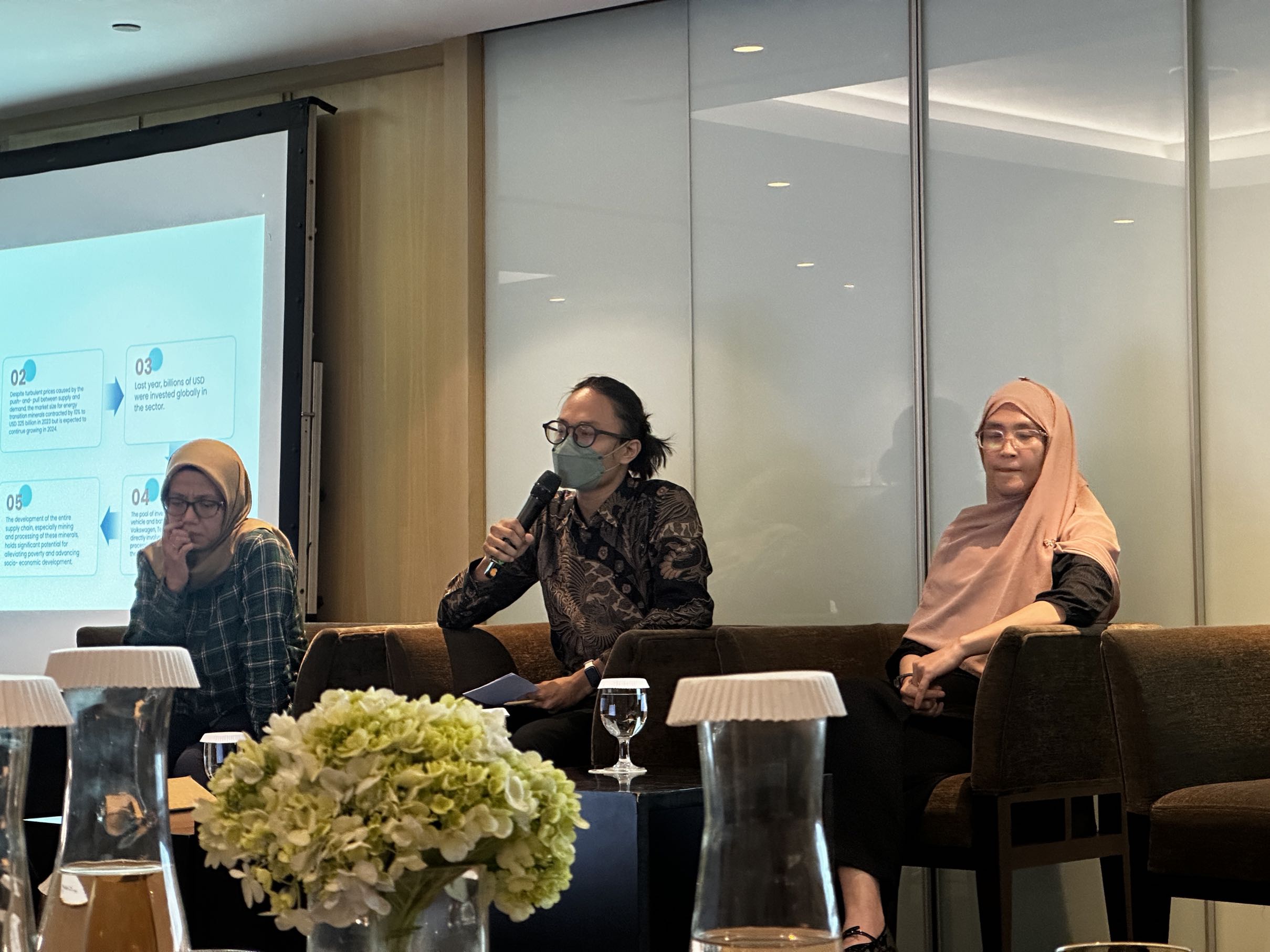Jakarta — In the context of the energy transition toward a low-carbon economy, Indonesia faces a serious challenge: How can the supply chain for critical minerals—particularly nickel—be managed in a fair and responsible manner? This question was at the heart of the Stakeholder Dialogue Towards a More Responsible Nickel Supply Chain, held on April 24, 2025, in Central Jakarta. The event was organized by the Secretariat of the Extractive Industries Transparency Initiative (EITI) Indonesia in collaboration with Publish What You Pay (PWYP) Indonesia, the International Institute for Sustainable Development (IISD), and supported by Viriya ENB. The dialogue brought together representatives from over 25 institutions and organizations to discuss sustainability challenges in Indonesia’s nickel industry—a key pillar in the global energy transition.
As the world’s largest nickel producer, Indonesia plays a crucial role in meeting the soaring demand for critical minerals needed in electric vehicle (EV) batteries, low-carbon energy technologies, and battery storage systems. According to the International Energy Agency (IEA), global demand for these minerals is projected to quadruple by 2040, with Indonesia’s critical mineral sector estimated to surpass USD 30 billion annually by 2030. However, the rapid expansion of nickel mining and processing has raised concerns over deforestation, biodiversity loss, environmental degradation, social inequality, and violations of the rights of local communities, especially women and vulnerable groups.
This one-day workshop served as a platform to share best practices on Environmental, Social, and Governance (ESG) standards, and to foster dialogue among government officials, industry leaders, civil society organizations, and international partners. Chrisnawan Anditya, Head of the EITI Indonesia Secretariat, delivered a keynote speech highlighting Indonesia’s strategic role in the global energy transition. He emphasized the need for sustainable mining practices, including reclamation, post-mining restoration, and eco-friendly refining technologies to balance economic growth with environmental and social responsibility.
ESG has now become an international standard demanded by global markets and investors. Unfortunately, implementation in Indonesia still faces significant challenges. ESG standards are fragmented across various regulations, there is no unified guideline, and not all companies, particularly small-scale miners, have the capacity to implement them.
Tubagus Nugraha, Executive Director for Policy Synchronization of Priority Economic Programs, emphasized Indonesia’s vast mineral potential and the growing global demand for critical energy transition minerals like nickel. He noted that adopting ESG improves market access and competitiveness, aligning with standards such as the EU Battery Passport and the U.S. Inflation Reduction Act.
Cecep Mochammad Yassin, Director of Mineral Enterprises at the Directorate General of Minerals and Coal, Ministry of Energy and Mineral Resources (MEMR), highlighted the ministry’s efforts to improve governance through digital tools like the Minerba Online Monitoring System (MOMS) and community empowerment and land reclamation initiatives, with 25,089.21 hectares rehabilitated as of 2023. Cecep acknowledged that the licensing governance process remains overwhelmed, especially after the transfer of authority to the central government. At the same time, there are still no concrete incentives for companies that adopt sustainable mining practices.
“Large mining companies may be close to compliance, but what about small miners or cooperatives who are unfamiliar with ESG?” he asked.
IISD and PWYP Indonesia presented a scoping study revealing that, although the export ban policy has increased state revenues fifteen fold from 2016 to 2023, coal-powered smelters pose significant environmental risks. The study found that 60% of companies struggle with ESG indicators, highlighting the need for stronger regulations and alignment with global standards such as the Initiative for Responsible Mining Assurance (IRMA). Policy recommendations include green fiscal incentives, mandatory ESG disclosure, and a ban on marine tailings disposal to ensure a sustainable nickel supply chain. PWYP and IISD also stressed the importance of information transparency, engagement with affected communities, and the application of performance-based social and environmental incentives or sanctions.
“Transparency and social justice must be the foundation of Indonesia’s ESG policies, not just technical compliance,” said Azil from PWYP Indonesia.
Private sector representatives from Harita Group, PT Vale Indonesia, and the Indonesian Nickel Miners Association (APNI) shared their approaches to adopting voluntary ESG standards, driven by market demand and the need for operational efficiency. Meanwhile, international organizations such as IRMA, the Responsible Critical Mineral Initiative, and the Intergovernmental Forum on Mining advocated for aligning Indonesian regulations with global frameworks, such as the OECD Due Diligence Guidance, to enhance transparency and community involvement.
The dialogue proposed concrete steps to strengthen Indonesia’s nickel supply chain, including integrating ESG into national policies, mandating the use of renewable energy, and enforcing mine rehabilitation funds. Social measures such as Free, Prior, and Informed Consent (FPIC) for Indigenous communities and benefit-sharing models were emphasized to ensure equitable outcomes. The adoption of digital platforms like Minerba One Data and gap analyses to align with IRMA and Global Reporting Initiative (GRI) standards were also recommended to enhance transparency and compliance.
Participants agreed that nationally aligned ESG standards with global benchmarks are essential for maintaining Indonesia’s competitiveness in the EV battery supply chain. The government was urged to act as a catalyst by offering incentives such as tax reductions and streamlined permitting to accelerate ESG adoption.
